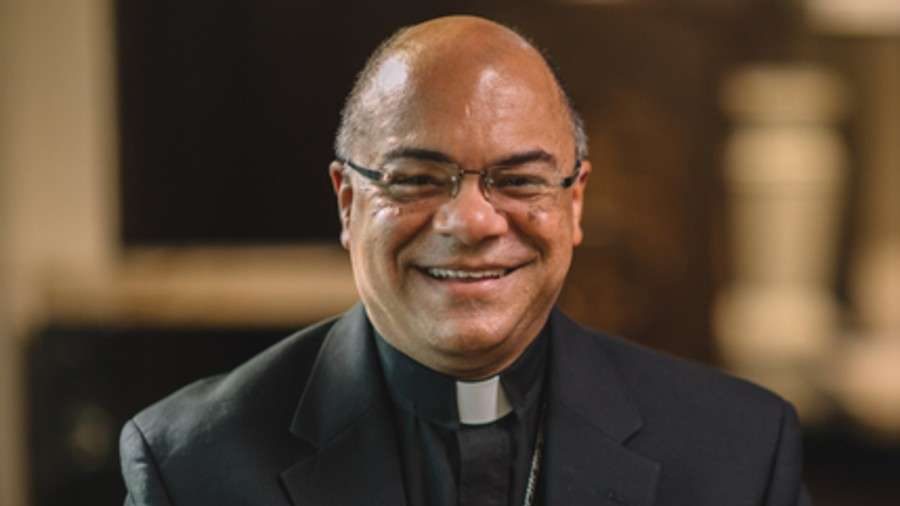The U.S. bishops on Tuesday praised a virtual exhibit created by the Diocese of Green Bay, which features portraits of racially diverse Catholics from the diocese and testimonies about their experiences.
The exhibit, Open Wide Our Hearts, was developed by Peter Weiss, the Living Justice Advocate for the Diocese of Green Bay. Weiss told CNA that his job is primarily a teaching role, seeking to promote Catholic social teaching and raise awareness of problems of injustice.
In 2017, the same year Weiss started at his current position, the U.S. bishops formed the Ad Hoc Committee Against Racism in response to increasing racial tensions and an outburst of violence in Charlottesville, when a white nationalist attacked counter-protesters of a far-right gathering, killing three and injuring 19.
Since its formation, the committee has produced an award-winning children’s book on healing and reconciliation, as well as organizing a day of prayer and fasting in reparation for sins of racism this summer. The bishops this week voted overwhelmingly to renew the ad hoc committee for another three-year period.
Weiss started to consider how he could use his position to help to bring the issue of racial justice into the conversation in Green Bay— a diocese which, he notes, is probably "about 90% white."
"The experiences of particular racial or ethnic groups is not the same as what the vast majority of people are having within our diocese. And I think it's important to reach out and find those stories, learn a little more, and find out what they can tell us about our understanding of ourselves as Catholics," he said.
On a personal level, Weiss said, reports of various killings of black men by police was disturbing to him, in no small part because he has several biracial nieces and nephews.
Around 2018, Weiss attended a traveling photo exhibit in his community chronicling the experiences of racially diverse people, and was inspired to create a similar project for the diocese.
Weiss admits that he had no prior experience as a photographer or a curator of art exhibits. So, that November, he enlisted the help of several leaders of various ethnic groups within the diocese as an advisory team.
The exhibit was inspired in part by the U.S. bishops’ 2018 pastoral letter Open Wide Our Hearts, which condemns racism as a failure to acknowledge others as children of God.
The exhibit features the portraits and testimonies of African Americans, Africans, Native Americans, Asians, and others, all of whom are Catholics who live in the diocese.
One of the portraits in the virtual gallery is of Gerry Martins, who is originally from India and who came to the U.S. as a Catholic missionary.
Martins told CNA that he was glad Weiss approached him to invite him to be a part of the project, adding that he is an amateur photographer in addition to being a missionary and father.
The exhibit seeks to convey the honest experiences of diverse people within the Church, Weiss said, and is not explicitly "about" racism, though some of the subjects do talk about racism they have experienced firsthand.
Though Martins said he has not experienced any overt racism since he arrived in Wisconsin, moving to such a predominantly white area made him feel like he "stuck out" occasionally at Mass and at Catholic functions.
He said the project has been "prophetic" in a way, since the Catholic Church has, since the events of 2020, been focusing more and more on the topic of racism. Martins recently moved with his family to Savannah, and he has shared the virtual gallery with many of his fellow Catholics in his new diocese. A lot of the feedback has been positive, he said.
Martins encouraged Catholics to be open to listening to other people's experiences, rather than staying closed in stereotypical views. He said he hopes Catholic people of various ethnicities will be open to talking about their culture and traditions.
"We need to be open to listening...it will be good to have these conversations so people feel included. We are an inclusive Church, and everyone is welcome in the body of Christ. I'm definitely hoping we can get the conversation started," he said.
The exhibit launched as a traveling in-person gallery during November 2019, and ran until March 2020, when it was forced to close amid the coronavirus pandemic.
When protests erupted during the summer of 2020, Weiss said he was inspired to work with the diocesan communications team to adapt the exhibit into an online presentation.
Weiss said he hopes people from all around the country will find the photos and stories compelling and relatable, even if they are specific to people within Green Bay. He said he also hopes that other dioceses may see the online exhibit and be inspired to create their own.
Bishop Shelton Fabre of Houma-Thibodaux, chair of the U.S. bishops’ ad hoc committee against racism, praised the virtual exhibit Nov. 17 during the U.S. bishops’ annual fall meeting.

